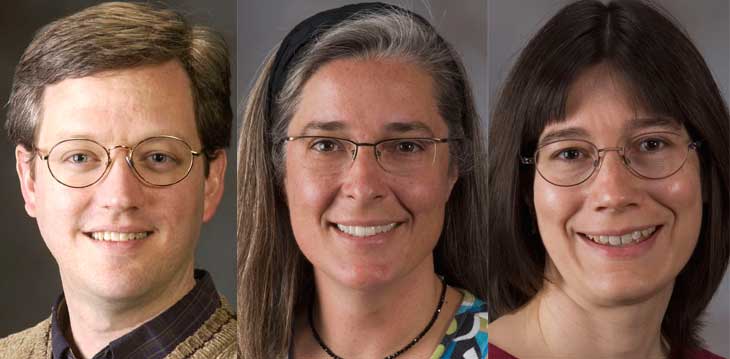Three College of Science faculty members win teaching awards

Three faculty members in the College of Science have been recognized for their accomplishments in teaching. Daniel Crawford, associate professor of chemistry; Jeanine Eddleton, instructor of chemistry; and Ann M. Stevens, associate professor of biological sciences, were awarded the Dr. Carroll B. Shannon Certificate of Teaching Excellence earlier this spring.
Daniel Crawford
Crawford joined the chemistry department in 2000. He is currently the sole teacher of Physical Chemistry, which is widely regarded as the most difficult class required for chemistry majors. Yet, his average student evaluation rating is 3.87 out of a possible 4.0. His students note that he can make the most difficult concepts understandable. Under Crawford's tutelage, student participation in physical chemistry has nearly doubled.
"Daniel has literally changed students' perceptions of physical chemistry," said Joe Merola, professor and department chair. "Students say he is demanding, but gives them all the tools they need to succeed, especially his time."
Crawford received his bachelor's degree from Duke University, and his Ph.D. from the University of Georgia. His research interests include quantum chemistry, electronic structure of radical species, and the construction of diagnostics for testing the completeness/adequacy of the one-electron basis sets used in quantum calculations.
Jeanine Eddleton
Eddleton has been teaching chemistry at Virginia Tech for the past 21 years. One of her many accomplishments was the transformation of Introduction to Chemistry for non-majors from a traditional lecture course to a demonstration-based learning experience. She also pioneered the use of Tablet PCs in the large lecture undergraduate chemistry classrooms, and researched the contributions and limitations of open-source online course system management in large lecture classrooms.
"Jeannine carries out what seems to be a very difficult task: to teach chemistry to non-science majors," Merola said. "Yet she performs that task exceedingly well and garners nearly perfect evaluation scores from students."
Eddleton earned both her bachelor's and master's degrees in chemistry from Virginia Tech. She is also active in the university's Faculty Development Institute, which assists faculty members in various aspects of instructional technology into their classrooms. She is pursuing a Ph.D. in education from Virginia Tech.
Ann Stevens
Stevens joined Virginia Tech as a microbiologist in 1996. The courses she teaches include General Microbiology, Cell and Molecular Biology, and Microbial Physiology. Students describe her as one of the best professors at Virginia Tech, and particularly note the time she spends preparing for class, her excellent review sessions, and her challenging but fair tests.
"Ann is one of our department's most skilled lecturers, using active learning exercises to build interest and enhance learning outcomes," said Robert Jones, professor and department chair. "Furthermore, she has an amazing number of high quality contributions to our overall teaching mission, including graduate student advising, curriculum development, engagement of students with professional activities, undergraduate research, outreach to local primary and secondary schools and classroom teaching."
Stevens earned her bachelor's degree from Iowa State University and her master's and doctoral degrees from the University of Illinois Urbana. Her research expertise is in the field of environmental sensing and control of gene expression in bacteria.
About the College of Science
The College of Science at Virginia Tech gives students a comprehensive foundation in the scientific method. Outstanding faculty members teach courses and conduct research in biology, chemistry, economics, geosciences, mathematics, physics, psychology, and statistics. The college is dedicated to fostering a research intensive environment and offers programs in many cutting edge areas, including those in nanotechnology, biological sciences, information theory and science, and supports the university's research initiatives through the Institute for Critical Technologies and Applied Sciences, and the Institute for Biomedical and Public Health Sciences. The College of Science also houses programs in intellectual property law and pre-medicine.




